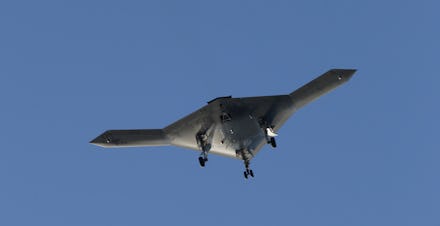Facebook's Next Big Potential Acquisition Is Not Your Average Tech Startup

After purchasing WhatsApp for a staggering $19 billion, Facebook has set its sights on its next, rather surprising purchase: drones.
According to TechCrunch, the tech giant is in talks to buy Titan Aerospace, a New Mexico-based start-up that manufactures near-orbital, solar-powered drones that can fly without landing for five years. The estimated price tag is a cool $60 million, although that is chump change in Facebook's vast pocket.
But why would a social media company want to buy drones? The answer: Internet connectivity. For years, Facebook has been on a $1 billion mission to bring the Internet to the 5 billion people on Earth who cannot access it. Last year, it partnered with companies such as Samsung and Nokia to launch Internet.org, which will build cheap but high-quality smartphones to increase Internet access around the world.
But this Titan Aerospace purchase might be Facebook's most significant step towards achieving global connectivity. The company's drones would cover the parts of the world that most need access, starting with Africa. Though the drones would not be full-orbital satellites, they are less expensive and more versatile alternatives that happen to orbit above airspace the U.S. can regulate.
Here is a video demonstration of how these drones work:
The idea of using aerial vehicles to increase Internet access is also being explored by other tech companies. Google has a rather fantastical, Pixar-level idea: flying balloons to bring 3G access to remote areas. Watch the announcement video for "Project Loon":
The Media Development Investment Fund is also working on a project called the Outernet, which hopes to use hundreds of low-cost satellites to broadcast certain websites to countries with national censors. The one-way transmission would allow people to flick through websites, just as they would with television channels and radio stations.
Still, Facebook's project may be the most ambitious yet, and it is sure to be a game-changer in the online market. In light of Facebook's accessibility goals, its costly purchase of WhatsApp makes sense: a basic version of the app would function on the drone Internet signal, potentially allowing billions of users to connect with the Internet — specifically, with Facebook — for very little cost.
"I'm focused on this because I believe it is one of the greatest challenges of our generation. The unfair economic reality is that those already on Facebook have way more money than the rest of the world combined, so it may not actually be profitable for us to serve the next few billion people for a very long time, if ever. But we believe everyone deserves to be connected," wrote Facebook founder Mark Zuckerburg in his whitepaper.
But if it does become profitable, Facebook may have the monopoly over a vast swath of the global population, introducing billions of new customers to — what else — Facebook.
Editor's Note: The Media Development Investment Fund is an investor in PolicyMic.